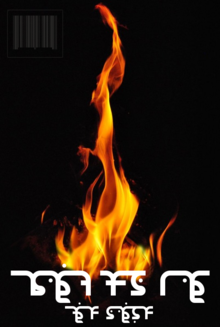Archive:The Lesson and The Sword
 5th Edition (2000) Istani Front Cover | |
| Author | Uram Servan |
|---|---|
| Original title | Aferu ũs Tell |
| Country | Istan |
| Language | Istani Baredan |
| Genre |
|
| Set in | Istan, Jute |
| Published | 1786-89 |
The Lesson and The Sword (Istani: Aferu ũs Tell /ɛ:.fɪ.ru ũ tɪtɬ/) is a novel, originally published in three volumes, by celebrated Istani writer, lawyer and natural philosopher Uram Servan, first published after Servan's death in 1786; it's publication was proscribed during Servan's lifetime. It is considered the foremost work of literature in all of the Istani corpus, and indeed amongst the greatest works of Baredan fiction ever written; Norjihani author Saddan Verad Larl declared the work "Certainly the most respected work of fiction amongst our great people [The Baredans]... deeply insightful and infinitely playful".
The novel follows a young Istani officer (whose name is never revealed) who follows a mysterious Xhovian fleet to the island of Jute - on the way discovering that they intend to colonise the island - and his attempts to help the Juteans stand up against Xhovian aggression. He eventually leaves the Juteans, believing they are incapable of survival, and it is assumed the Xhovians enslaved and ate the population of the island. Servan began to write the novel after failing to be admitted onto one of the Istani Aristocratic Committies (bodies who offer advice and expertise on matters being put to vote) focusing on law, being blocked by his prominent rival Paren Saer. As such, the work is a satire, indirectly attacking the Istani government of the time on numerous occassions throughout, especially Saer. The novel is often seen as being staunchly anti-interventionist and anti-colonialist, although modern criticism has attacked it for being racist, both towards the Xhovians and to other cultures (in this case, the people of Jute).
Initial Publication
Servan originally planned to release the novel as a standalone work in 1786, having written it in the period 1780-1785 in a number of bursts; it was begun soon after he was refused membership of the Committee of Legal Affairs. However, his attempts to publish the work were opposed by the Pyçaşim (the main legislature of the Istani government, filled by citizens elected via sortition), and after his release of a section of the novel in an Istani periodical caused public outcry, all of his works were proscribed. After his death, however, a group of his friends agreed to publish the novel. It was released in three volumes, the first two consisting of three sections and the final of four; Servan had originally split the book into ten sections, much like the ten years of the Gennist Calendar. Each of them has their own title, derived from the text of the book:
- Volume One | The Pursuit of Nothing: Covers the first three sections, exploring the life of The Officer in Istan and his original pursuit of the Xhovians alongside Vers
- Volume Two | The Endless Night of the Heart: The next three sections, which recount The Officer's journey through Sjuu and across the sea to Jute, where he first comes into contact with the Juteans
- Volume Three | The Call of the Native: The final four sections, in which The Officer tries to group the Juteans into a force to fight off the Xhovians, and how he proceeds to give up on them and returns to Istan. In the final section, he returns to discover his father has died and his siblings have divided the inheritance amongst themselves, leaving The Officer with nothing.
The sections themselves each have the titles given to them by Servan, related to parts of Gennist scripture (see below).
Synopsis
The Pursuit of Nothing
The first section, entitled "On The Birth" - a reference to the birth of Uled (the first human in Gennist mythology) or of Mahadras Mahadrin (an Istani/Norjihani semi-mythic hero) - introduces us to the main character, The Officer, whose name is never revealed. He has just graduated from military school and been assigned to his army when the book begins.
The Endless Night of the Heart
The Call of the Native
Themes
Colonialism
Race
Istani Politics
Relationships
Religion
Main Characters
- The Officer - The Officer is the main character of the book, and the book follows his journey to and from Istan. The book essentially serves as a subverted Bildungsroman around The Officer; he begins the book having just become an Officer in the Istani army, but it is soon revealed he is not as mature as he thinks; he gets into a brawl and proceeds to be cast down to the lowly position of head of the guard of Myski. The journey to and from Jute then serves as his 'coming of age', as he discovers the world and comes to terms with it. His youthish optimisim is slowly worn down throughout the journey, but he has become a more mature man as a result. However, when he returns, it is discovered he now has nothing, and despite the moral value of his journey he has gained nothing at all. The Officer's name is never revealed, but it is presumed that The Officer is supposed to be Servan himself; taking this view allows us to see the story as an autobiographical text, following his legal and especially political career.
- Vers
- Talbr